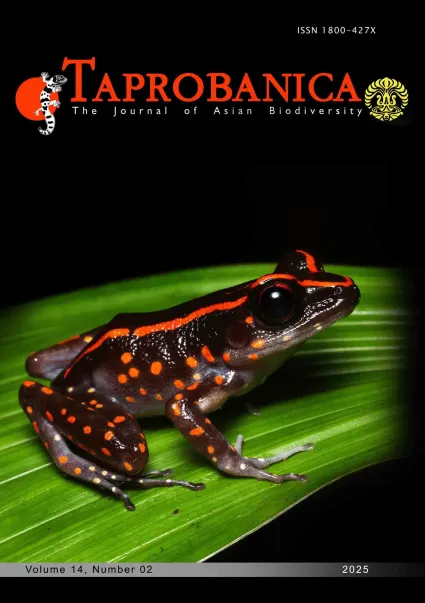

v14i2.364
Volume 14 | Number 2 | November 2025
Major Article
eISSN: 1800-427X (online)
DOI:10.47605/tapro.v14i2.364
Submitted date: 11 September 2024
Accepted date: 25 June 2025
Published date: 21 July 2025
Pp. 121–131.
IMPACTS OF BIMATURISM AND FRUIT AVAILABILITY ON THE BEHAVIOUR OF MALE SUMATRAN ORANGUTANS, Pongo abelii LESSON, 1827 (PRIMATES: HOMINIDAE)
Tri Rahmaeti*, Caroline Schuppli, Tatang Mitra Setia & Sri S. Utami-Atmoko
*Corresponding author. E-mail: trirahmaeti@gmail.com
Abstract
Adult male orangutans can be described as flanged and unflanged, which are two morphologically distinct stages of sexual maturity (bimaturism). Bimaturism influences male orangutan behaviour, though specific effects remain unclear. This study examines the behavioural ecology of adult male Sumatran orangutans in Suaq Balimbing, Sumatra. We found that both male morphs spent over 60% of their time feeding, but unflanged males engaged in significantly more social interactions than flanged males. The diets of both morphs were mostly composed of fruit, and there were no significant differences in the proportions of time spent feeding on different types of food. Unflanged males travelled significantly longer distances, likely to access more dispersed food sources and social opportunities. With increasing fruit availability, social interactions and daily travel lengths of unflanged males decreased, whilst social interactions and daily travel lengths of flanged males increased. These results shed novel light on how male orangutans adjust their behaviour in response to ecological factors.
Section Editor: Juan O. Perea-García
DOI:10.47605/tapro.v14i2.364
Submitted date: 11 September 2024
Accepted date: 25 June 2025
Published date: 21 July 2025
Pp. 121–131.
IMPACTS OF BIMATURISM AND FRUIT AVAILABILITY ON THE BEHAVIOUR OF MALE SUMATRAN ORANGUTANS, Pongo abelii LESSON, 1827 (PRIMATES: HOMINIDAE)
Tri Rahmaeti*, Caroline Schuppli, Tatang Mitra Setia & Sri S. Utami-Atmoko
*Corresponding author. E-mail: trirahmaeti@gmail.com
Abstract
Adult male orangutans can be described as flanged and unflanged, which are two morphologically distinct stages of sexual maturity (bimaturism). Bimaturism influences male orangutan behaviour, though specific effects remain unclear. This study examines the behavioural ecology of adult male Sumatran orangutans in Suaq Balimbing, Sumatra. We found that both male morphs spent over 60% of their time feeding, but unflanged males engaged in significantly more social interactions than flanged males. The diets of both morphs were mostly composed of fruit, and there were no significant differences in the proportions of time spent feeding on different types of food. Unflanged males travelled significantly longer distances, likely to access more dispersed food sources and social opportunities. With increasing fruit availability, social interactions and daily travel lengths of unflanged males decreased, whilst social interactions and daily travel lengths of flanged males increased. These results shed novel light on how male orangutans adjust their behaviour in response to ecological factors.
Section Editor: Juan O. Perea-García
- List of Articles & Contents





